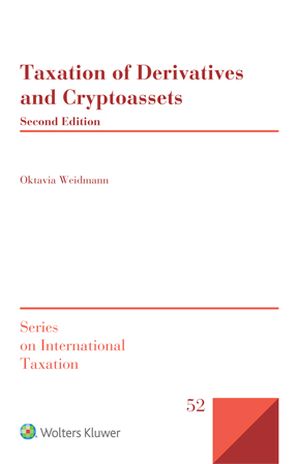Taxation of Derivatives and Cryptoassets 2nd ed
ISBN13: 9789403523835
Published: June 2024
Publisher: Kluwer Law International
Country of Publication: The Netherlands
Format: Hardback
Taxation of Derivatives and Cryptoassets
is a comprehensive book addressing the key accounting and tax issues of derivatives and cryptoassets in domestic and cross-border transactions. Specific references are made to UK, German and Swiss tax law.
While the first edition of this book focused solely on derivatives, this updated second edition adds cryptoassets, crypto derivatives and ESG investment products to the analysis. It also comments on global tax policy developments, such as the OECD Base Erosion Profit Shifting (BEPS) 1.0 and 2.0. projects.
What’s in this book:
The updated edition includes the following topics:
- basic financial concepts relating to derivatives and cryptoassets
- definition of derivatives for tax purposes and its application to crypto derivatives and ESG derivatives, among others
- domestic and international accounting rules applying to derivatives and cryptoassets
- current state of the taxation of derivatives and cryptoassets in the UK and Germany and tax policy alternatives
- characterisation of derivatives gains and losses as income or capital, and equity or debt
- accounting and taxation of hedging transactions involving derivatives or cryptoassets
- accounting and taxation of structured products and hybrid instruments, including those linked to crypto and ESG
- withholding taxes on derivatives and the concept of beneficial ownership in a domestic and cross-border context, and
- anti-avoidance legislation applying to derivatives and cryptoassets, including the domestic law implementation of BEPS Action 2, the EU Anti-Tax Avoidance Directives (ATAD I and II), the tax transparency rules for cryptoassets (DAC8) and Pillar Two
How this will help you:
This book provides an in-depth exploration of the accounting and tax treatment of derivatives, cryptoassets and ESG investment products in a domestic and cross-border context and uses various examples to illustrate the existing rules and viable policy alternatives. It is, therefore, a vital resource for anyone working in tax policy, deploying professional tax advice to companies, banks or investment funds relating to derivatives or cryptoassets, or researching those topics.
